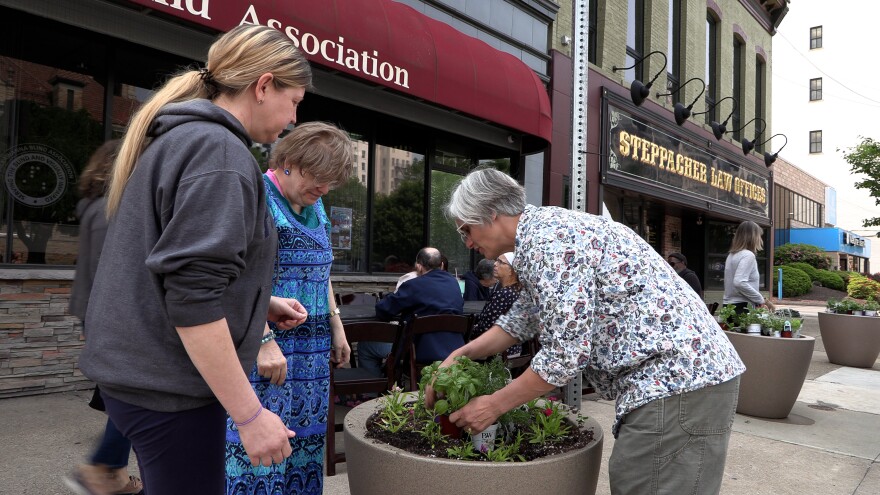Scranton’s newest garden shows that plants aren’t just for looking at.
Herbs like curry and sage have a unique scent that can be detected by those who are visually impaired. The various textures of flowers appeal to another sense.
The sensory garden, planted with help from Scranton Tomorrow and Penn State Master Gardeners, encourages clients of the Lackawanna Blind Association to connect with nature.
Gardening for the visually impaired
PLANT PEOPLE
An occasional feature highlighting gardening tips, projects and inspiration.
Scranton Tomorrow and Penn State Master Gardeners hosted a workshop at the Lackawanna Blind Association to plant some herbs and flowers that appeal to all the senses.
This is one of several beautification projects happening around the city as part of Scranton City Pride.

“We chose plants based on their scent and their texture,” said Steve Ward, project manager at Scranton Tomorrow.
Spearmint, curry, kale and other greenery were passed around the table. After each client got a feel and a sniff, the gardeners guided them as they got their hands dirty.
The herbs and flowers were placed in six planters on Adams Ave. outside of the Lackawanna Blind Association, which provides services for blind and visually impaired individuals.
"It's been fun," said Theresa Rook. "It's good to see plants up close and to plant them, which I can't do in my yard."
“These sensory gardens really do give you an appreciation for nature at a deeper level because you’re using more of your senses," Ward said. "In this case, if you have some sight limitations, you still can be engaged and be active in the landscape.”

Volunteers from the Penn State Master Gardener program in Lackawanna County provide tips and work with the organization to keep the garden maintained throughout the season.
“We do visit the [Lackawanna] Blind Association once a month and do an activity,” said Jill Baer, the Penn State Master Gardener coordinator for Lackawanna and Luzerne counties. “And we’ll continue to check on those plantings, keep them weeded and watered and looking good.”
What is a Penn State Master Gardener?
Master gardeners complete an intensive horticulture training to earn certification, and then use their skills to educate and beautify their community.
Penn State Extension offers courses in Pennsylvania, and there are currently more than 3,500 master gardener volunteers in the state.
The initial training runs from October to March, and participants are required to complete 50 hours of volunteer service within that year.
“Once they've completed all of that, then they become a master gardener,” Baer said. “Every year, they are required to have continuing education and to give volunteer service hours as well.”

The hybrid education program includes webinars and weekly meetups in your county.
Ward, also a Penn State Master Gardener, says the training is pretty intense.
“It’s like a survey of all home horticulture topics like biology, soil health, entomology, study of bugs,” he said. “We work with the general public answering home horticulture questions, giving advice and workshops. But it’s all research-based and reliable.”
The Master Gardeners in Lackawanna County work with area schools, maintain community gardens and more.
“Being a master gardener can look a lot of different ways,” Bear said. “It could mean giving a formal presentation somewhere. It could also mean working with preschoolers.”
The application deadline to become a Penn State Master Gardener in Lackawanna County is August 1.


